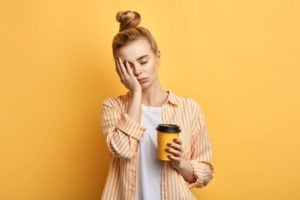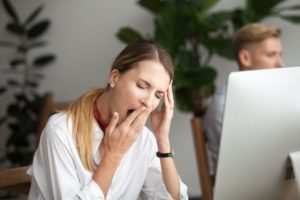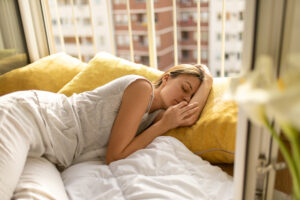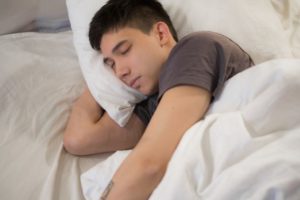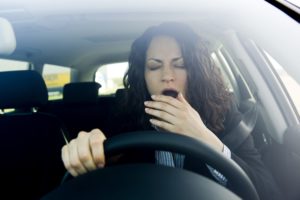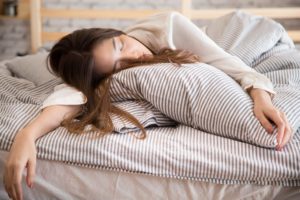Diagnosing Excessive Sleepiness
- Excessive sleepiness refers to extreme tiredness and a strong urge to sleep during the day.
- A proper diagnosis of excessive sleepiness often requires a medical evaluation of all symptoms involved.
- Sleep studies can help identify the underlying sleep disorder or health condition causing excessive sleepiness.
If you have trouble staying awake during the day or feel sleepy on a regular basis, you may have excessive sleepiness, a common condition that affects up to 25% of the American population. Unfortunately, many people go about their daily lives feeling excessively sleepy without mentioning it to their doctor.
Excessive sleepiness takes a toll on your work, school, relationships, and daily life. It can cause car accidents and workplace injuries. If you constantly feel sleepy even after sleeping a sufficient amount, it may be beneficial to talk to your doctor about your sleepiness.
How Is Excessive Sleepiness Diagnosed?
Excessive sleepiness is one of the most common sleep complaints people have besides insomnia. Excessive sleepiness should be brought to the attention of a health care provider, as it could be a sign of an underlying health condition or sleep disorder — especially if you believe you are getting enough sleep, eating well, and exercising regularly. If you have an upcoming physical or wellness visit, discuss excessive sleepiness with your doctor then. If not, consider scheduling an appointment with your primary care doctor to discuss why you feel tired all the time.
Your doctor can diagnose the cause of your excessive sleepiness and recommend next steps. However, doctors may not ask about sleep issues unless they have reason to believe there is a problem. Be sure to voice your concerns during your appointment so your health care provider can investigate and treat the root causes of your sleep issues.
Preparing for Your Sleep Appointment
Your doctor will ask some questions to figure out why you are constantly tired. You can come prepared for your appointment by contemplating your responses to these questions ahead of time, and even writing them down. These questions may include:
- How long have you been feeling excessively sleepy?
- Do you have difficulty falling or staying asleep at night?
- Do you feel this sleepy every day, on a regular basis?
- Do you feel drowsy while working or driving? Have you ever fallen asleep doing these activities?
- Do you wake up during the night? If so, how many times and how often during the week?
- How many hours of sleep do you get on a typical weeknight and weekend night?
- What is your bedtime and wake time?
- Has your sleep partner noticed you make any loud snores or choking sounds during your sleep?
- Do you exhibit symptoms of other sleep disorders, such as teeth grinding, restless legs sensations, or abnormal movements during sleep?
- Is there anything that makes your sleep schedule irregular, such as a new baby, shift work, medical condition, or stress?
- Do you follow a healthy diet?
- How often do you consume caffeine, alcohol, nicotine, or other drugs?
- Does anyone in your family have a sleep disorder?
To answer these questions accurately, it can be helpful to keep a sleep diary in the two weeks leading up to your appointment. Write down when you went to bed, when you woke up, the total amount of time you slept, and whether or not you woke up during the night. You can also use a sleep tracking device to help you record your sleep-related data.
During your appointment, be sure to inform your doctor of your personal and family medical history, and of any medications you are currently taking.

Determining the Cause of Excessive Sleepiness
Excessive sleepiness is often a symptom of an underlying disorder or other health concern. Once your doctor determines you have excessive sleepiness, they may diagnose the cause of the problem, order tests if necessary, and provide recommendations for treatment.
Your doctor may determine your sleepiness is due to poor sleep hygiene, such as an irregular sleep schedule or drinking too much caffeine or alcohol. They will provide recommendations on how to improve your sleep behaviors.
Excessive sleepiness is a common symptom of undiagnosed sleep apnea, narcolepsy, hypersomnia , restless legs syndrome, and circadian rhythm disorders like shift work disorder. If your doctor suspects a sleep disorder is a reason you feel tired all the time, they may refer you to a sleep center. There, you may take a number of tests.
- Epworth Sleepiness Scale: Your visit will likely begin by filling out the Epworth Sleepiness Scale . This scale is a simple diagnostic questionnaire that asks you to rate your likelihood of falling asleep on a scale of 0 to 3 in eight situations, such as while watching TV or being stopped in traffic.
- Polysomnogram: If the doctor suspects you have sleep apnea, they might recommend a sleep study, or polysomnogram. During this exam, you will spend the night at a sleep center with technicians monitoring your brainwaves, heart and lung activity, breathing patterns, body movements, and other key vitals while you sleep.
- Multiple Sleep Latency Test: If you exhibit symptoms of idiopathic hypersomnia or narcolepsy, the doctor may also administer a Multiple Sleep Latency Test (MSLT) after your polysomnogram. In this exam, you will be asked to take five 20-minute naps, at two-hour intervals during the day. They will record how long it takes you to fall asleep.
- Maintenance of Wakefulness Test: Although this is not used for diagnostic purposes, a Maintenance of Wakefulness Test (MWT) may be ordered. This exam measures the opposite of the MSLT, or how long you can stay awake. It may be used to evaluate patient safety in activities such as driving.
Excessive sleepiness can also be a side effect of certain medications, in which case your doctor may suggest prescribing an alternative medication. Several health conditions can also contribute to excessive sleepiness, such as anemia, depression, fibromyalgia , chronic kidney disease , liver disease , chronic obstructive pulmonary disease (COPD) , diabetes , hypothyroidism, congestive heart failure , vitamin deficiency, Addison’s disease, adrenal insufficiency, or allergic rhinitis . If your doctor suspects an underlying health condition is contributing to your sleepiness, they may order blood work or refer you to another specialist.

Still have questions? Ask our community!
Join our Sleep Care Community — a trusted hub of product specialists, sleep health professionals, and people just like you. Whether you’re searching for the perfect mattress or need expert sleep advice, we’ve got you covered. Get personalized guidance from the experts who know sleep best.
References
11 Sources
-
Abad, V. C., & Guilleminault, C. (2003). Diagnosis and treatment of sleep disorders: A brief review for clinicians. Dialogues in Clinical Neuroscience, 5(4), 371–388.
https://pubmed.ncbi.nlm.nih.gov/22033666/ -
Chervin, R. D. (2021, September 29). Approach to the patient with excessive daytime sleepiness. In T. E. Scammell (Ed.). UpToDate., Retrieved April 3, 2023, from
https://www.uptodate.com/contents/approach-to-the-patient-with-excessive-daytime-sleepiness -
Anderson, K. N., Pilsworth, S., Sharples, L. D., Smith, I. E., & Shneerson, J. M. (2007). Idiopathic hypersomnia: A study of 77 cases. Sleep, 30(10), 1274–1281.
https://pubmed.ncbi.nlm.nih.gov/17969461/ -
Murray B. J. (2016). A practical approach to excessive daytime sleepiness: A focused review. Canadian Respiratory Journal, 2016, 4215938.
https://pubmed.ncbi.nlm.nih.gov/27445538/ -
Office on Women’s Health, U.S. Department of Health and Human Services. (2019, April 1). Fibromyalgia. Womenshealth.gov., Retrieved April 3, 2023, from
https://www.womenshealth.gov/a-z-topics/fibromyalgia -
Maung, S. C., El Sara, A., Chapman, C., Cohen, D., & Cukor, D. (2016). Sleep disorders and chronic kidney disease. World Journal of Nephrology, 5(3), 224–232.
https://pubmed.ncbi.nlm.nih.gov/27152260/ -
Enezi, A., Al-Jahdali, F., Ahmed, A. E., Shirbini, N., Harbi, A., Salim, B., Ali, Y. Z., Abdulrahman, A., Khan, M., Khaleid, A., & Hamdan, A. J. (2017). Symptoms of daytime sleepiness and sleep apnea in liver cirrhosis patients. Annals of Hepatology, 16(4), 591–598.
https://pubmed.ncbi.nlm.nih.gov/28611264/ -
Enz, C., Brighenti-Zogg, S., Steveling-Klein, E. H., Dürr, S., Maier, S., Miedinger, D., & Leuppi, J. D. (2016). Predictors of increased daytime sleepiness in patients with chronic obstructive pulmonary disease: A cross-sectional study. Sleep Disorders, 2016, 1089196.
https://pubmed.ncbi.nlm.nih.gov/27822390/ -
Inkster, B., Riha, R. L., Van Look, L., Williamson, R., McLachlan, S., Frier, B. M., Strachan, M. W., Price, J. F., & Reynolds, R. M. (2013). Association between excessive daytime sleepiness and severe hypoglycemia in people with type 2 diabetes: The Edinburgh type 2 diabetes study. Diabetes Care, 36(12), 4157–4159.
https://pubmed.ncbi.nlm.nih.gov/24089545/ -
Riegel, B., Ratcliffe, S. J., Sayers, S. L., Potashnik, S., Buck, H. G., Jurkovitz, C., Fontana, S., Weaver, T. E., Weintraub, W. S., & Goldberg, L. R. (2012). Determinants of excessive daytime sleepiness and fatigue in adults with heart failure. Clinical Nursing Research, 21(3), 271–293.
https://pubmed.ncbi.nlm.nih.gov/21878581/ -
Kakumanu, S., Glass, C., & Craig, T. (2002). Poor sleep and daytime somnolence in allergic rhinitis: Significance of nasal congestion. American Journal of Respiratory Medicine: Drugs, Devices, and Other Interventions, 1(3), 195–200.
https://pubmed.ncbi.nlm.nih.gov/14720057/


